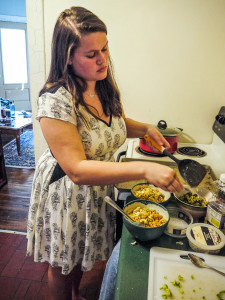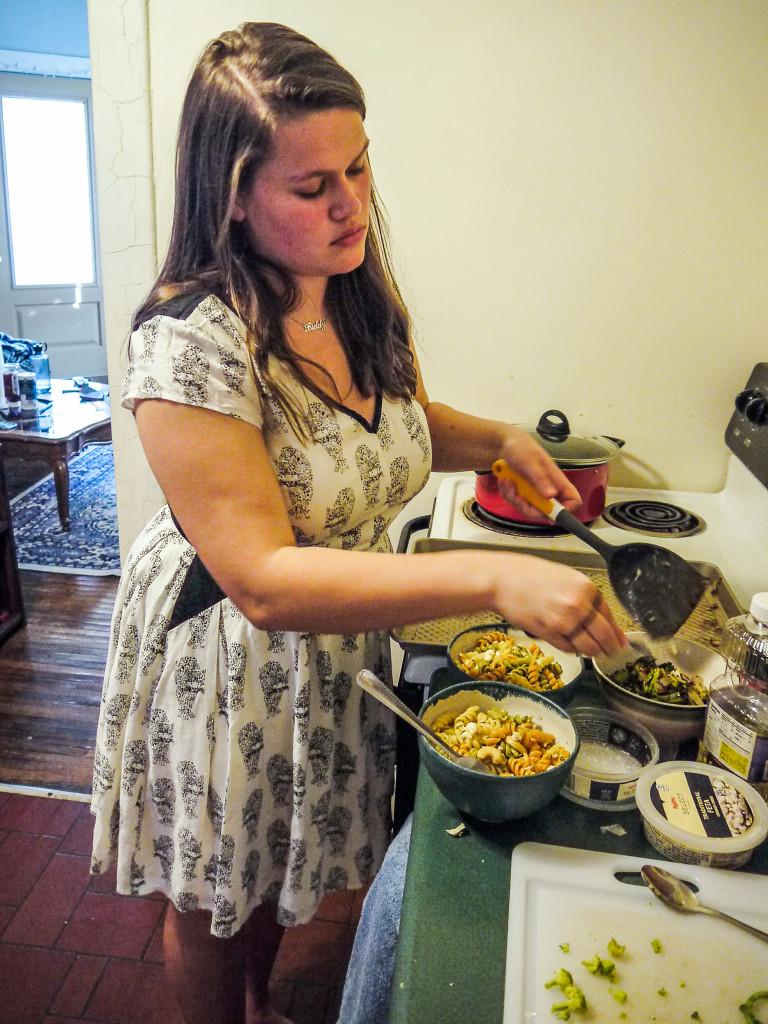Megan Tcheng
tchengme@grinnell.edu
For most Grinnell students, the world of fine dining rarely makes it beyond the plastic trays and P-card swipes of the dining hall. Every so often, in a rare moment of inspiration (or desperation), packages of instant ramen and Kraft Mac & Cheese add to the gastronomic repertoire of hungry students. A select group of campus foodies, however, have taken their culinary endeavors to the next level.
The S&B interviewed student chefs Addie Coley ’16, Matt Dole ’15.5, Tess Fisher ’18 and Victor Phimphachanh ’18 to see what happens when one trades in serving spoons for spatulas.
Together, the four students lay claim to a mouth-watering range of culinary achievements. With personal specialties that range from crowd-pleasing classics like Fisher’s freshly baked bread, to lesser-known dishes like Dole’s “Eggs in Purgatory” (poached eggs with crushed tomatoes), the chefs prove just how rewarding it can be to look beyond the confines of instant noodles and powdered cheese.
Universally, food stands as a reminder of community and familial connection. When asked to reflect on their relationship with food, the students noted how cooking and appreciating food holds a similarly personal meaning.
“My dad has always loved cooking. For him, cooking is his way of communicating his love for me and my family. So for me, cooking is something you do for people you care about,” Coley reflected.
Fisher, a current member of Food House, one of Grinnell’s off-campus project houses, shared a parallel connection.
“When I joined Food House, I went from cooking myself really simple meals, straight into this environment that’s all about celebrating food and coming together through food. That community sparked why I love to cook now,” Fisher said.
Cooking, despite its undeniable reward, also comes with its own set of obstacles. As full-time college students, the chefs spoke to the difficulty of balancing their personal commitments with the time constraints of cooking.
“If you’re trying to cook for yourself, you really have to take your schedule into consideration. I generally try to keep my Sundays open so I can make some kind of meal for myself,” Fisher explained.
Phimphachanh echoed the same sentiment.
“Time is so crucial. There are times when I tell myself that I can’t cook because I have things going on with school. Now, I have to find a balance between what I can cook and when I cook,” he said.
When asked to share their advice for fellow students, all four chefs offered up a similar set of recommendations. Both Fisher and Dole agreed that the first step for any aspiring chef is stocking up on a kitchen essentials.
“Really all you need is a pot, a pan, and a couple classic spices — and from there you can make a lot of really easy meals,” Fisher suggested. In addition, Dole noted that one should not “be afraid to invest in your materials … and guard them with your life.”
Coley also stressed the importance of starting simple.
“Just choose a few things that you really enjoy making and, if you can afford to, stock up on those ingredients,” she recommended. “When I lived in the Grinnell dorms, I bought a cookie sheet, a pot, and a strainer so I could make roasted broccoli and mac and cheese. It wasn’t very complicated, but it was nice to be able to do something for myself every once and a while.”
Additionally, Phimphachanh emphasized the importance of finding a community of fellow chefs.

Photo by Leina’ala Voss.
“Try to find friends that will cook with you. When you have to cook every day, it can become somewhat of a chore — but, if you make a plan and split up the work, it forces you develop a habit,” he advised.
Perhaps most importantly, the student chefs stressed the importance of making cooking a priority.
“I don’t think there’s any such thing as being a bad cook. You just have to learn how to be comfortable in the kitchen — and that just takes a little time and practice,” Coley said.





























































